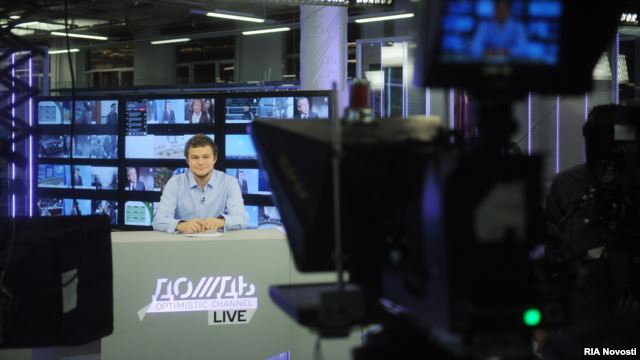
Clampdown on Free Speech in Russia as Fallout From Ukrainian Crisis
Publication: Eurasia Daily Monitor Volume: 11 Issue: 19
By:

Moscow-based, independent television cable news channel Dozhd (meaning “Rain”) has been accused of “extremism,” and a number of cable TV providers threatened to remove it from the TV-channel packages that they offer their subscribers.
On January 26, 2014, in “Dilettanty”—a panel discussion program on the Dozhd channel that deals with history topics—viewers were asked to vote if Leningrad (today St. Petersburg), besieged during World War II by Nazi troops, should have surrendered to save civilian lives (the siege or blockade of Leningrad lasted from 1941 to 1944 and more than a million civilians died, mainly from starvation). The question was posted on the Dozhd website, but was soon removed and the channel apologized. Nevertheless, a firestorm of criticism erupted. The St. Petersburg legislature called for an official investigation of Dozhd and its closure for its “unpatriotic” question that “falsifies the history of the Great Patriotic War.” The Russian State Duma is considering passing a similar resolution. The St. Petersburg prosecutor’s office announced it has begun an official investigation of Dozhd: “To determine if the channel has crossed the line of permissibility during the celebration of the 70th anniversary of the end of the blockade of Leningrad” (https://www.interfax.ru/russia/txt/354861).
President Vladimir Putin’s press secretary Dmitry Peskov, in an interview to Dozhd stated, “The channel has crossed the line of permissibility, of what our people may allow.” Peskov stated that by dropping Dozhd from their channel offerings, the numerous television providers in Moscow and in the Russian provinces are “acting on their own as citizens of Russia,” who do not want to lose public support and subscribers (https://www.interfax.ru/russia/txt/354809).
Russian human rights groups are supporting Dozhd. And the channel has reported a surge of viewers phoning their providers to return it to air as well as an influx of new online subscriptions to watch the channel on the Internet. The CEO and owner of Dozhd, Natalya Sindeyeva, believes the independent TV channel is being censured for supporting well-known opposition figure Alexei Navalny’s investigations into corruption by Russian elites; and the Leningrad blockade question was only a pretext to launch an attack on the independent channel (https://www.newsru.com/russia/30jan2014/sindeeva.html).
The pro-Kremlin tabloid Komsomolskaya Pravda has called the Dozhd channel a liberal outpost run by Jews, homosexuals and “insects” (https://www.kp.ru/daily/26186.5/3074644/). This propaganda tempest may eventually subside, but it is increasingly connected to the political crisis in Kyiv. In a pre-recorded (and edited) primetime panel discussion of the situation in Ukraine on the main Russian state TV channel Rossya 1, it was clamed that Dozhd and other Russia liberal news outlets “are the leaders of a fifth column that is preparing a Kyiv-style ‘Maidan’ revolution in Moscow,” financed by Russian enemies in the West (https://russia.tv/video/show/brand_id/21385/episode_id/962492/video_id/965157#). The possibility of the opposition succeeding in altering the balance of power in Kyiv has been causing a hysterical reaction in Moscow: Revisionists that want to restore a Russian or Soviet empire, nationalists, as well as anti-gay, anti-Western and anti-liberal reactionaries—who have formed Putin’s main ideological and political powerbase—see the recent events in Kyiv as catastrophic and have been given primetime access to air their frustration.
This week (January 28), Ukrainian President Viktor Yanukovych made some concessions in an apparent attempt to end the mass protests in Ukraine by accepting the resignation of Prime Minister Mykola Azarov, while the Ukrainian parliament (Verkhovna Rada) recalled a package of draconian laws severely curtailing democracy and civil rights, approved during a highly controversial vote on January 16 (see EDM, January 28). The overall political crisis in Ukraine is in no way resolved, but in Moscow even limited concessions made by Yanukovych are seen as a dangerous surrender (https://www.kommersant.ru/doc/2394428).
Putin has been publicly downplaying the significance of the dismissal of Azarov and his government. Last month, Putin promised Yanukovych to cut the price Ukraine pays for Russian natural gas and to provide Kyiv with $15 billion in emergency loans. The first $3 billion was provided in December 2013 by the Russian government buying a special issue of Ukrainian Eurobonds. This week, Putin stressed these agreements still hold despite the resignation of Azarov, but he also hinted there were political strings attached to Russian aid. Kyiv wants Moscow to disburse $2 billion more of the promised credit before the end of January, but it does not seem it will be arriving in Kyiv’s coffers immediately. During a cabinet meeting this week in Moscow chaired by Putin, First Deputy Prime Minister Igor Shuvalov insisted that Moscow must first wait and see the composition of the new Ukrainian government before disbursing more aid. Prime Minister Dmitry Medvedev supported Shuvalov: “We had specific agreements with Azarov that must be honored.” Medvedev complained that Kyiv is not repaying its debt for previous gas shipments and not fully paying for newly pumped gas, despite receiving Russian loan money. Apparently Putin supported a wait-and-see attitude promoted by Medvedev and Shuvalov (https://www.interfax.ru/print.asp?sec=1447&id=354645).
Putin’s cautious response to the latest developments in Ukraine seems to be splitting his powerbase, as nationalists and revisionists desperately call for a more aggressive, interventionist policy. Yanukovych is described in Moscow as a weakling and a proxy of the United States, who takes direct orders from Washington (https://regnum.ru/news/polit/1760124.html). Komsomolskaya Pravda reports from Kyiv that the local US embassy is directly paying cash in dollars to opposition street activists, whom the paper compares to al-Qaeda and the Nazis. The same report calls Russia “weak,” accuses Moscow of indecisiveness, and underscores that the rumors of the “Russian spetsnaz [special forces] landing from planes near Kyiv” are untrue. “By acting in an unfaltering manner, Russia could create on its borders a totally friendly state, by sending Western Ukraine to go its own way.” Pro-Russian Ukrainians in the East and South of Ukraine are Russia’s real “compatriots,” while people from Central Asia are not (https://www.kp.ru/print/26186.5/3074717/).
Putin is increasingly under pressure internally to intervene in Ukraine to defeat the US-led conspiracy. And if the entirety of Ukraine cannot be salvaged, the Russian president is being pressed to carve out and annex (integrate) the east and south of the divided nation. The same reactionaries, nationalists and imperial revisionists that supported Putin by opposing pro-democracy protests in 2011 and 2012 in Moscow and are now leading an assault on Dozhd and other leftovers of free speech, are demanding action in Ukraine. Putin may be increasingly in conflict with his radicalized powerbase and may be forced to radicalize himself in internal and external political decision-making.




